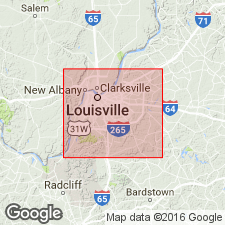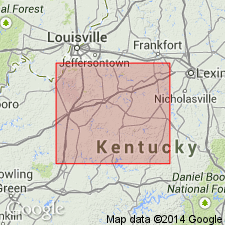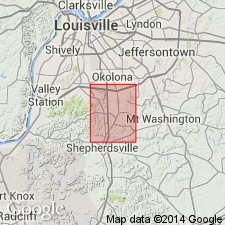
- Usage in publication:
-
- Holtsclaw sandstone
- Modifications:
-
- Named
- Dominant lithology:
-
- Sandstone
- AAPG geologic province:
-
- Cincinnati arch
Summary:
Named Holtsclaw sandstone. Unit is "a bluish-gray or buffish, rather loosely cemented, soft and easily disintegrated, very fine-grained, thick to massive bedded" sandstone. Moderately fossiliferous in places, brachiopods are most common form. Prevailing thickness about 20 ft. Underlain by Rosewood shale; overlain by Warsaw limestone.
Source: GNU records (USGS DDS-6; Reston GNULEX).

- Usage in publication:
-
- Holtsclaw Siltstone Member*
- Modifications:
-
- Principal reference
- Revised
- Redescribed
- AAPG geologic province:
-
- Cincinnati arch
Summary:
Holtsclaw sandstone of Butts (1915) reduced in rank to Holtsclaw Siltstone Member and assigned to Borden Formation. Type section designated. "Chiefly medium-gray to olive-gray siltstone that weathers yellowish gray or light olive gray. The silt, somewhat calcareous and clayey, is medium to fine according to size analyses and locally interbedded with thin shale or crinoidal limestone. The Holtsclaw overlies and intertongues laterally with the Nancy Member and is overlain abruptly by the Muldraugh Member.
Source: GNU records (USGS DDS-6; Reston GNULEX).

- Usage in publication:
-
- Holtsclaw Siltstone Member*
- Modifications:
-
- Overview
- AAPG geologic province:
-
- Cincinnati arch
Summary:
Holtsclaw Siltstone Member of Borden Formation. "Siltstone and silty shale: Siltstone, medium-gray to olive-gray; weathers yellowish gray; quartzose, micaceous, argillaceous, locally contains scattered rounded limestone concretions, which contain fossil remains; forms prominent, massive-weathering smooth faces on steep slopes and cliffs." Some layers particularly near top contain abundant fossils. Interbedded silty shale is greenish-gray to olive-gray and fairly resistant to weathering. Thickness ranges from 28 to 133 ft. Gradationally overlies Nancy Member; overlain by Muldraugh Member with definite contact. Age is Mississippian.
Source: GNU records (USGS DDS-6; Reston GNULEX).
For more information, please contact Nancy Stamm, Geologic Names Committee Secretary.
Asterisk (*) indicates published by U.S. Geological Survey authors.
"No current usage" (†) implies that a name has been abandoned or has fallen into disuse. Former usage and, if known, replacement name given in parentheses ( ).
Slash (/) indicates name conflicts with nomenclatural guidelines (CSN, 1933; ACSN, 1961, 1970; NACSN, 1983, 2005, 2021). May be explained within brackets ([ ]).

